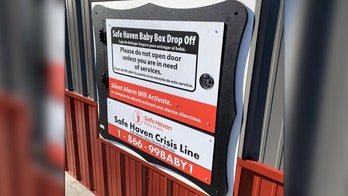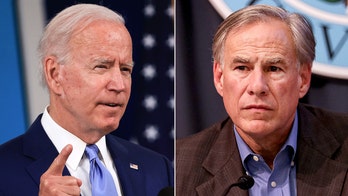Romney: America wants someone who understands the economy
GOP frontrunner talks new poll numbers, presidential bid
Mitt Romney leads the pack in the race for the Republican presidential nomination. He’s also the second pick for enough Rick Santorum and Newt Gingrich supporters that if one of them dropped out, Romney would remain the frontrunner.
Romney has the backing of 38 percent of Republican primary voters in a Fox News poll released Wednesday. He’s followed by Santorum at 32 percent, Gingrich at 13 percent and Paul at 12 percent.
Click here for full Fox News poll results.
Support for Romney is up 5 percentage points since last month’s Fox poll, while Santorum is up 9 points. Gingrich has dropped by 9 points.
Both Gingrich and Santorum have said they would defeat Romney in a one-on-one contest. The poll, which asked primary voters about their second-choice candidates, suggests that might not be true.
If Gingrich were out of the race, his backers mainly say they would go to Santorum, yet the shape of the race would look about the same with Romney maintaining a narrow 4-percentage point edge over Santorum: 43-39 percent.
If Santorum were out, for the most part his supporters would split between Gingrich and Romney, which would increase Romney’s advantage over his nearest competitor to more than 20 points: 49 percent Romney to Gingrich’s 25 percent.
In a straight two-way matchup, GOP primary voters prefer Romney to Santorum by 49-44 percent.
Primary voters who are age 65 and over, wealthier, or have a college degree are more likely to back Romney. Groups more likely to support Santorum include white evangelical and born-again Christians, very conservative voters and those who are part of the Tea Party movement.
Meanwhile, a 58-percent majority of primary voters would rather nominate a candidate who is more likely to beat President Obama, even if the candidate is not a true conservative. Less than a third -- 31 percent -- would pick the true conservative who might be less electable.
Majorities of Republicans have a favorable opinion of Santorum (61 percent) and Romney (60 percent), while more have a negative than a positive view of Gingrich and Paul.
The poll was conducted after Super Tuesday, when Romney won six states to Santorum’s four (Gingrich won Georgia), and also after Santorum’s win in the Kansas caucuses on Saturday. Interviews were completed before Tuesday’s voting in Alabama and Mississippi.
Almost all GOP primary voters -- 93 percent -- think Romney is qualified to manage the economy, compared to 76 percent who think Santorum is and 74 percent who say the same of Gingrich.
Views are similar for foreign policy: 90 percent of primary voters think Romney is qualified to be commander in chief, while 77 percent say Santorum is and 74 percent believe Gingrich is qualified.
After months of campaigning and some 20 GOP debates, the process is taking a toll. More than three times as many voters think the race for the nomination has divided the Republican Party and weakened the candidates (66 percent) as say it has energized the party and strengthened the candidates (19 percent).
Republicans (32 percent) are much more likely than Democrats (13 percent) or independents (10 percent) to think the contest has energized their party. Still, a 56-percent majority of Republicans agrees the nomination process has been damaging.
Even so, primary voters would still prefer to see the race continue for months and their candidate win (52 percent), than have it end soon and see their candidate lose (36 percent).
Santorum voters are holding out for a victory -- 62 percent would prefer he wins the nomination, even if the race continues for months. That’s far more than the 24 percent who prefer the race ends as soon as possible.
Romney voters are more likely to feel the opposite: 54 percent would rather see the race end as soon as possible, even if he loses the nomination.
The poll shows fewer voters view the Republican Party positively (39 percent) than have a favorable opinion of the Democratic Party (48 percent). Yet that was also the case before this year’s primaries began. Last summer, 35 percent of voters had a favorable view of the GOP and 41 percent gave a thumbs up to the Democratic Party (August 2011).
The Fox News poll is based on landline and cell phone interviews with 912 randomly-chosen registered voters nationwide and was conducted under the joint direction of Anderson Robbins Research (D) and Shaw & Company Research (R) from March 10 to March 12. For the total sample, it has a margin of sampling error of plus or minus 3 percentage points. For the subgroup of 341 GOP primary voters it is plus or minus 5 percentage points.





